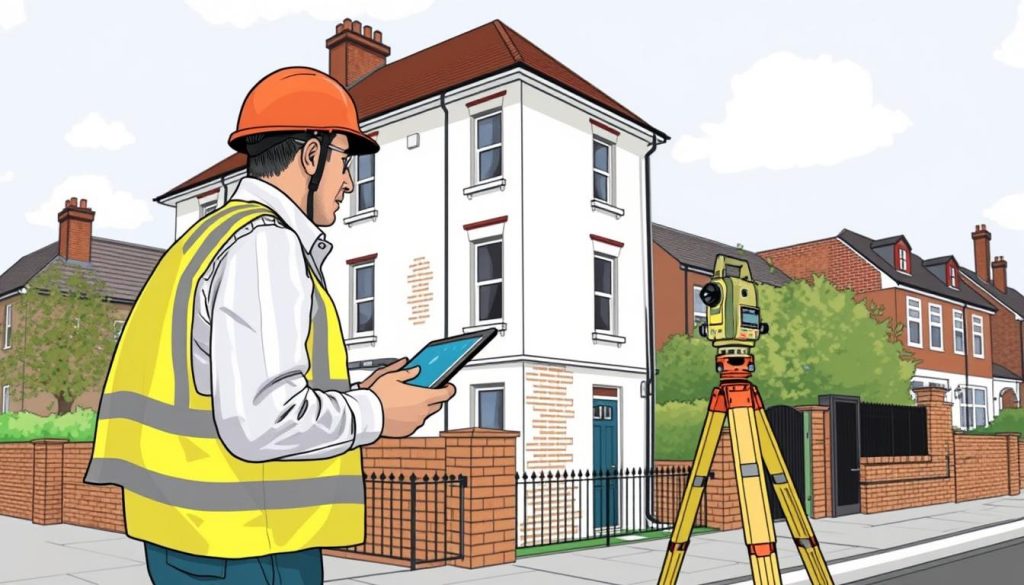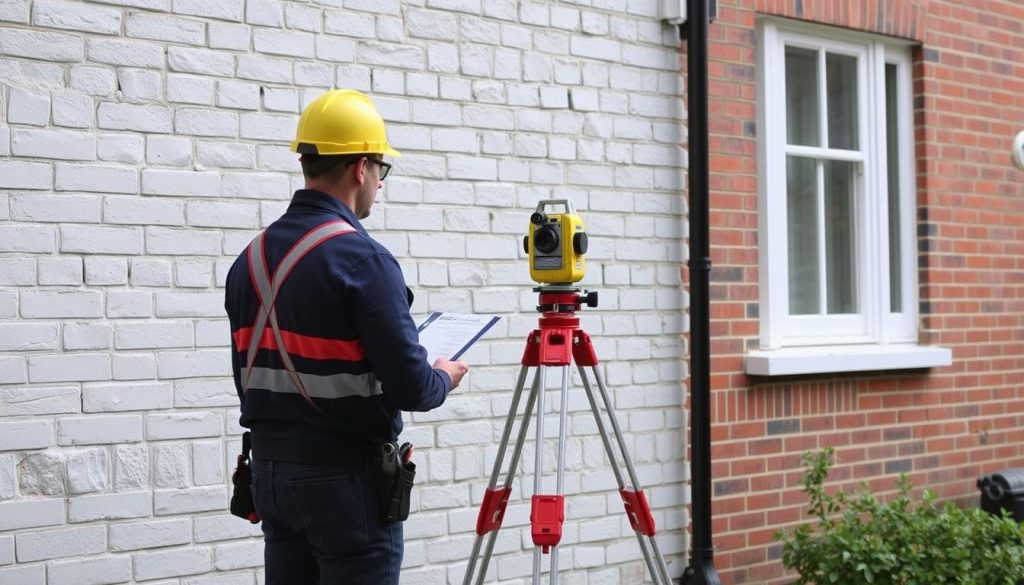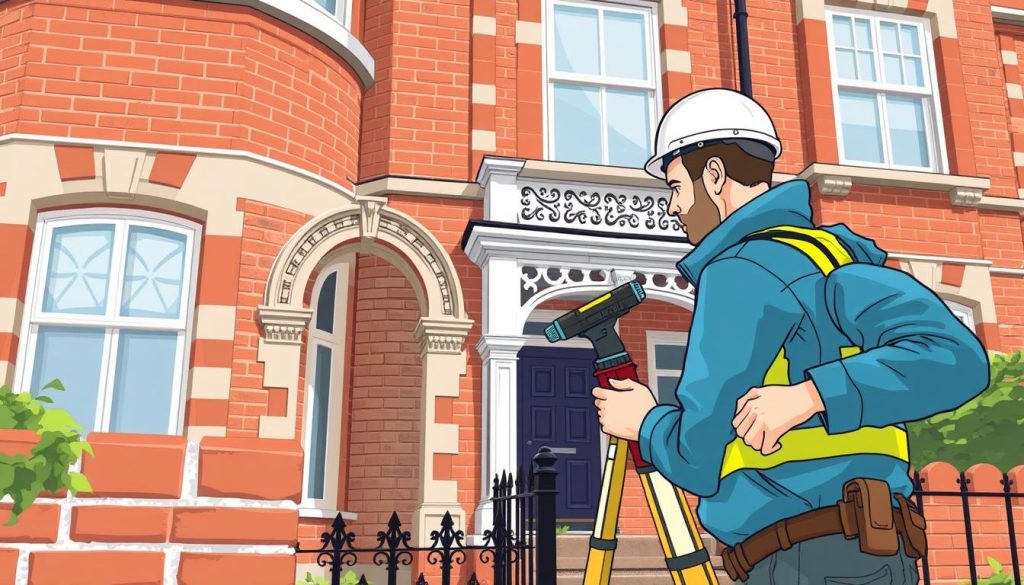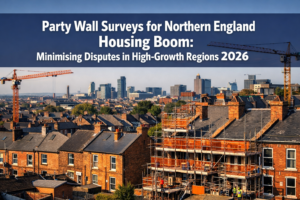When undertaking construction works in London, understanding the role of a party wall agreement surveyor is important. A party wall is a shared boundary or structure between two properties, commonly found in terraced and semi-detached houses, but this is also relevant for detached properties with shared garden walls or boundary lines.
What happens when you need to work on this shared structure? That’s where a party wall surveyor comes in. They ensure that your construction project complies with the Party Wall etc. Act 1996, protecting both your interests and those of your neighbour.
So, when do you need a party wall surveyor, and how do they help? We’ll explore these questions and more in this guide, providing you with the knowledge you need to navigate property projects in London with confidence.
Key Points
- Understand the role of a party wall agreement surveyor in London property projects.
- Learn when you legally need a party wall surveyor for your construction works.
- Discover how a surveyor protects both your and your neighbour’s property interests.
- Get insights into the Party Wall etc. Act 1996 and your legal rights.
- Find out the typical costs of hiring a party wall surveyor in London.
Understanding Party Walls and the Party Wall Act
For homeowners and builders alike, grasping the basics of party walls and the associated legal framework is essential. When undertaking construction works, it’s vital to understand how the Party Wall etc. Act 1996 applies to your project.
What is a Party Wall?
A party wall is a shared wall that stands astride the boundary between two properties. It can also refer to a wall on one property that is used by neighbouring properties. The Party Wall etc. Act 1996 provides a legal framework for dealing with party walls, ensuring that the rights of both property owners and their neighbours are protected during construction works.
Understanding what constitutes a party wall is crucial for property owners. It helps in identifying when the Act applies and what procedures need to be followed.
The Party Wall etc. Act 1996: Key Points
The Party Wall etc. Act 1996 is designed to prevent and resolve disputes between neighbours regarding party walls. Here are some key points about the Act:
- The Act covers three main types of work: work on existing party walls, excavations near neighbouring buildings, and the construction of new walls on or astride the boundary line.
- It requires property owners to serve a Party Wall Notice to their neighbours before starting certain construction works.
- The Act provides a procedure for resolving disputes that may arise during the construction process.
- It ensures that the work is carried out in a way that minimises damage to neighbouring properties.
By understanding the Party Wall etc. Act 1996, property owners can better navigate the complexities of construction projects involving shared walls and boundaries.
When Do You Need a Party Wall Notice?
Understanding when to serve a party wall notice is crucial for any building work that affects a shared wall or boundary. The Party Wall etc. Act 1996 stipulates that you must give your neighbour written notice before commencing certain types of work.
To ensure your project complies with the law, it’s essential to know the types of work that require a notice and the timeframes involved.
Types of Work Requiring Party Wall Notice
There are primarily two categories of work that necessitate serving a party wall notice: work directly on a party wall and excavations near neighbouring buildings.
- Work on a party wall includes tasks like cutting into a wall, raising or demolishing it, or inserting a damp proof course.
- Excavations within a certain distance of neighbouring buildings, especially if they involve digging deeper than the neighbour’s foundations, also require a notice.
For both categories, the notice period allows your neighbour time to respond and potentially agree or dissent to the proposed work.
Timeframes for Serving Notice
The timeframe for serving a notice varies depending on the type of work.
| Type of Work | Notice Period |
|---|---|
| Work on a party wall or boundary | 2 months |
| Excavations or building a new wall | 1 months |
After serving the notice, your neighbour has 14 days to respond. If they don’t respond within this timeframe, it’s considered a dispute, and you may need to appoint a surveyor to resolve the matter.
It’s also crucial to note that building work must commence within one year of serving the notice; otherwise, the notice becomes invalid, and you’ll need to serve a new one.
Understanding these timeframes and planning accordingly can help you avoid delays and ensure your project stays on track.
The Role of a Party Wall Agreement Surveyor

Navigating the complexities of party wall agreements requires the expertise of a qualified surveyor. When dealing with construction projects that involve shared walls, the role of a party wall agreement surveyor becomes indispensable. But what exactly does this professional do, and what qualifications should you look for?
What Does a Party Wall Surveyor Do?
A party wall surveyor is responsible for ensuring that works on a party wall are carried out in accordance with the Party Wall etc. Act 1996. This involves assessing the proposed work and ensuring that it does not cause unnecessary inconvenience or damage to the adjoining property. The surveyor’s role is to act impartially, making decisions that are fair and reasonable.
The surveyor will also prepare a schedule of condition to document the state of the adjoining property before the work begins. This record is crucial in preventing disputes over damage that may occur during the construction process.
Qualifications and Expertise
When selecting a party wall surveyor, it’s essential to consider their qualifications and expertise. A legitimate party wall surveyor should possess professional qualifications from a recognised body, such as Royal Institution of Chartered Surveyors (RICS), Chartered Institute of Building (CIOB), or Residential Property Surveyors Association (RPSA). These professionals have undergone rigorous training and have the necessary experience in dealing with party wall matters.
Party wall surveyors develop specific expertise that combines construction knowledge, legal understanding, and dispute resolution skills. Their experience with properties in London, or wherever the project is located, is particularly valuable as it allows them to understand local conditions and regulations.
By understanding the role and qualifications of a party wall surveyor, you can make an informed decision when selecting a professional for your project. This ensures that your interests are protected and that the construction process is carried out smoothly.
Responding to a Party Wall Notice: Your Options
When you receive a party wall notice, understanding your options need to be set out clearly. After a building owner serves a notice, the neighbour has 14 days to respond. This period is critical, and knowing how to navigate it can save time and potential disputes.
Consenting to the Works
If you consent to the works, you should respond in writing within the 14-day period. This consent allows the building owner to proceed with the planned works without needing to appoint a party wall surveyor. It’s a straightforward process, but it’s essential to ensure you’re comfortable with the proposed works.
Dissenting and the Implications
Dissenting means you disagree with the proposed works or have concerns. If you dissent, the building owner will need to appoint a party wall surveyor to resolve the dispute. As explained in our other article on Party Wall Agreements, dissenting can lead to a more complex process.
The 14-Day Response Window
The 14-day response window is a critical timeframe. If you fail to respond within this period, it’s considered a deemed dissent. To avoid this, calculate the 14 days carefully, excluding the day the notice was served. For example, if the notice was served on a Monday, the 14th day would be the following Monday (excluding the first Monday).
As a neighbour, responding promptly is vital. If you’re unsure about the works or need more time, consider seeking advice from a professional. As the Act states, the neighbour has 14 days to respond, and failure to do so can lead to a deemed dissent.
In conclusion, responding to a party wall notice requires careful consideration. Whether you consent or dissent, understanding the implications and the 14-day response window is critical. So, by knowing your options and acting promptly, you can navigate this process smoothly.
Agreed Surveyor vs. Two-Surveyor Appointment
When dealing with party wall matters, one crucial decision is whether to appoint an Agreed Surveyor or two separate surveyors. This decision can significantly impact the outcome of your construction project, particularly in terms of cost, dispute resolution, and the protection of your property interests.
The Party Wall etc. Act 1996 provides the framework for this decision, allowing for either an Agreed Surveyor or separate surveyors to be appointed by the building owner and the adjoining owner. But what does this mean in practice, and which option is best for you?
What Is an Agreed Surveyor?
An agreed surveyor is a single surveyor appointed by both the building owner and the adjoining owner to resolve party wall matters. The idea is that this surveyor acts impartially, making decisions that are fair to both parties. However, one of the main concerns with this approach is the potential for bias, particularly if the Agreed Surveyor is perceived to be favouring the party who is paying their fees – typically the building owner.

Despite this, an agreed surveyor can be a cost-effective and efficient solution, especially for straightforward projects where the relationship between the building owner and the adjoining owner is amicable.
When to Choose Separate Surveyors
In many cases, adjoining owners opt for separate surveyors because they believe it better protects their individual interests. Under this arrangement, each party appoints their own surveyor, and these surveyors work together to resolve any disputes. If the Two Surveyors can not agree, a Third Surveyor can be appointed to make a decisive award.
This approach is particularly beneficial for complex projects or when there’s a history of tension between the parties involved. While it may increase costs – the building owner is liable for the costs of both surveyors – it provides an added layer of protection and representation for both parties.
Ultimately, the choice between an Agreed Surveyor and separate surveyors depends on the specifics of your project, including its complexity, the relationship between the parties, and your individual concerns regarding cost and dispute resolution.
The Party Wall Agreement Process Explained

The party wall agreement process can seem daunting, but breaking it down into manageable steps can simplify the experience. When you’re planning construction work that affects a shared wall, understanding this process is vital to avoid potential disputes and ensure a smooth project execution.
Initial Notice and Response
The party wall agreement process begins with serving an initial notice to the adjoining owner(s), detailing the proposed work. This notice is a formal document that must be served in accordance with the Party Wall etc. Act 1996. The adjoining owner then has 14 days to respond, either by consenting to the work, dissenting, or not responding at all. A party wall surveyor can guide you through this process, ensuring all legal requirements are met.
Schedule of Condition Reports
Before work commences, a Schedule of Condition report is prepared to document the state of the adjoining property. This report is crucial in preventing potential disputes over damage caused by the construction work. The report is typically carried out by a party wall surveyor who meticulously records the condition of the adjoining property, including any existing damage.
Preparing the Party Wall Award
The Party Wall Award is a legally binding document that outlines the terms and conditions of the construction work. It is prepared by the party wall surveyor or surveyors appointed by the parties involved. The award details the work to be done, the method of construction, and any measures to be taken to protect the adjoining property. It serves as a safeguard for both parties, ensuring that the work is carried out fairly and with minimal disruption.
Implementing and Monitoring the Works
Once the Party Wall Award is in place, the construction work can commence. The surveyor plays an ongoing role in monitoring the works to ensure compliance with the award. This includes addressing any unexpected issues that arise during construction and handling concerns about damage or deviations from the agreed terms. Regular monitoring and clear communication are key to preventing disputes and ensuring the project’s success.
By understanding and following the party wall agreement process, London property owners can navigate complex construction projects with confidence. Engaging a professional party wall surveyor can provide invaluable guidance and protection throughout the process.
Costs of Party Wall Surveyors in London

The expense of party wall surveyors in London is a significant consideration for building owners who need to comply with the Party Wall Act. When undertaking construction or renovation work, understanding the costs involved in hiring a party wall surveyor is vital for budgeting purposes.
Party wall surveyors play a crucial role in ensuring that the work is carried out in accordance with the Act, protecting the interests of both the building owner and the adjoining owner. The cost of hiring these professionals can vary based on several factors, including the complexity of the work and the surveyor’s expertise.
Typical Fee Structures
The fees charged by party wall surveyors in London can differ significantly depending on the nature of the work and the surveyor’s qualifications. Typically, surveyors may charge a fixed fee or an hourly rate for their services. It’s essential to clarify the fee structure with your chosen surveyor at the outset to avoid any unexpected costs.
Some surveyors may also offer a package deal that includes all the necessary services, from serving the initial notice to preparing the party wall award. Understanding what’s included in the fee is important to making an informed decision.
Who Pays for the Surveyor?
Under the Party Wall Act, the building owner is generally liable for the costs of both their own surveyor and the adjoining owner’s surveyor. This arrangement is designed to protect the adjoining owner from incurring unnecessary expenses due to the building owner’s work.
Opting for an agreed surveyor can be a cost-effective solution for building owners, as it means they are only liable for the costs of one surveyor. However, in cases where separate surveyors are appointed, the building owner will need to cover the costs of both surveyors.
Benefits of Hiring a Professional Party Wall Surveyor
To avoid potential pitfalls in your building project, consider the benefits of appointing a professional party wall surveyor from the outset. Appointing a party wall surveyor at the start of the process is the best thing you can do to ensure all the correct procedures are being followed.
This matters because if the original notice isn’t valid, then any response received will consequently no longer be legally valid too. This can potentially open you up to objections, as well as potentially losing your neighbour’s good faith.
Protecting Your Property Interests
A professional party wall surveyor plays a crucial role in protecting your property interests. They ensure that the party wall procedures are followed correctly, which helps in preventing any damage to your property.
Key benefits include:
- Ensuring that the party wall notice is served correctly and is legally valid.
- Preparing a detailed Schedule of Condition to record the state of your property before work begins.
- Monitoring the works to prevent any damage to your property.
By having a surveyor, you can rest assured that your property is protected, and any potential issues are addressed promptly.

Avoiding Disputes and Delays
Professional party wall surveyors are also instrumental in avoiding disputes and delays. They facilitate communication between you and your neighbour, helping to reach an agreement on the proposed works.
| Benefits | Description |
|---|---|
| Facilitating Communication | Surveyors help in communicating with your neighbour, making it easier to arrive at an agreement. |
| Expert Knowledge | Their expertise in the Party Wall Act helps in avoiding common legal pitfalls. |
| Time and Cost Savings | Early surveyor involvement can save time and money against their fee. |
By understanding the role of a party wall surveyor, you can see how they are not just a legal requirement but a valuable asset to your building project.
Common Party Wall Disputes and How to Avoid Them
Disputes over party walls can be costly and time-consuming; proactive measures can help prevent them. When embarking on a construction project, it’s essential to understand the common causes of party wall disputes and how to mitigate them.
Typical Causes of Disputes
Party wall disputes often arise due to misunderstandings or lack of communication about the planned works. Common issues include damage to neighbouring properties, disagreements over the scope of work, and concerns about the impact on property values. For instance, a neighbour might object to the noise, disruption, or potential structural risks associated with the construction.
To avoid such disputes, it’s crucial to engage with your neighbours early and openly about your plans. This involves serving the appropriate party wall notice and being prepared to address any concerns they may have.
Preventative Measures
Preventing party wall disputes requires a combination of good communication, thorough preparation, and professional expertise. Appointing an experienced party wall surveyor can make a significant difference. They can help draft a comprehensive party wall award that outlines the work to be done, the schedule of condition, and the measures to be taken to protect neighbouring properties.
Maintaining good neighbour relations throughout the construction process is also vital. Regular updates and a willingness to listen to concerns can go a long way in preventing misunderstandings from escalating into disputes. By taking these proactive steps, you can ensure that your project proceeds smoothly, without the legal complications that often accompany party wall disputes.
Ultimately, the key to avoiding party wall disputes lies in thorough preparation, clear communication, and the expertise of a skilled wall surveyor who can guide you through the process and help resolve any issues that may arise.
Party Wall Surveyor Selection: What to Look For

When embarking on a construction project in London, the success of your endeavour partly depends on hiring a skilled party wall surveyor. A competent surveyor can guide you through the complexities of the Party Wall etc. Act 1996, ensuring that your project complies with all legal requirements.
Experience and Specialisation
It’s essential to look for a surveyor with extensive experience in handling party wall matters. Their specialisation should align with your specific construction or building needs. An experienced surveyor will be well-versed in the nuances of the Act and can provide valuable insights to prevent potential disputes.
Professional Memberships
Professional memberships are a good indicator of a surveyor’s commitment to staying updated with the latest practices and regulations. Look for surveyors who are members of reputable organisations, as this signifies their dedication to professional excellence in dealing with property and party wall issues. One example is the Faculty of Party Wall Surveyors (FPWS).
Client Testimonials and Case Studies
Evaluating client testimonials and case studies is crucial when selecting a party wall surveyor. These provide first-hand information about the surveyor’s competence and service quality. When reviewing testimonials, look for feedback on their professionalism, communication skills, and ability to resolve disputes. Relevant case studies can also give you an idea of their experience with projects similar to yours.
Conclusion on Party Wall Agreement Surveyors
To conclude, party wall agreement surveyors play a vital role in London’s construction projects.
Their expertise ensures compliance with the Party Wall Act, protecting property interests and neighbourly relations.
By understanding the legal requirements and the value professional surveyors bring, you can navigate the party wall process with confidence.
If you’re embarking on a building project, knowing the next steps to appoint a surveyor is crucial.
Proper party wall procedures safeguard your property and foster positive relationships with your neighbours.
FAQ
What is the purpose of the Party Wall etc. Act 1996?
The Act aims to prevent and resolve disputes between neighbours regarding construction works that affect shared boundaries or structures.
Do I need to serve a notice if I'm doing work on my own property?
You may need to serve a notice if your work affects a shared boundary or a structure that is shared with your neighbour, such as a wall or fence.
How long does a neighbour have to respond to a Party Wall notice?
A neighbour typically has 14 days to respond to a Party Wall notice. If they don’t respond, it is considered a dispute, and you may need to appoint a surveyor to resolve the matter.
What is a Schedule of Condition report, and why is it necessary?
A Schedule of Condition report documents the condition of a neighbour’s property before work begins. This helps prevent disputes over damage caused by the construction works.
Can I appoint a single surveyor to act for both me and my neighbour?
Yes, if you and your neighbour agree on a single surveyor, known as an Agreed Surveyor, it can simplify the process and reduce costs.
Who is responsible for paying the surveyor's fees?
Typically, the building owner (the person carrying out the works) is responsible for paying the surveyor’s fees, although this can be negotiated between the parties.
What happens if a dispute arises during the construction works?
If a dispute arises, the surveyors appointed by the parties will work together to resolve the issue and ensure that the works are carried out in accordance with the Party Wall Award.
How long does the Party Wall process typically take?
The duration of the Party Wall process varies depending on the complexity of the works and the level of agreement between the parties. It can take several weeks or even months to complete.
















